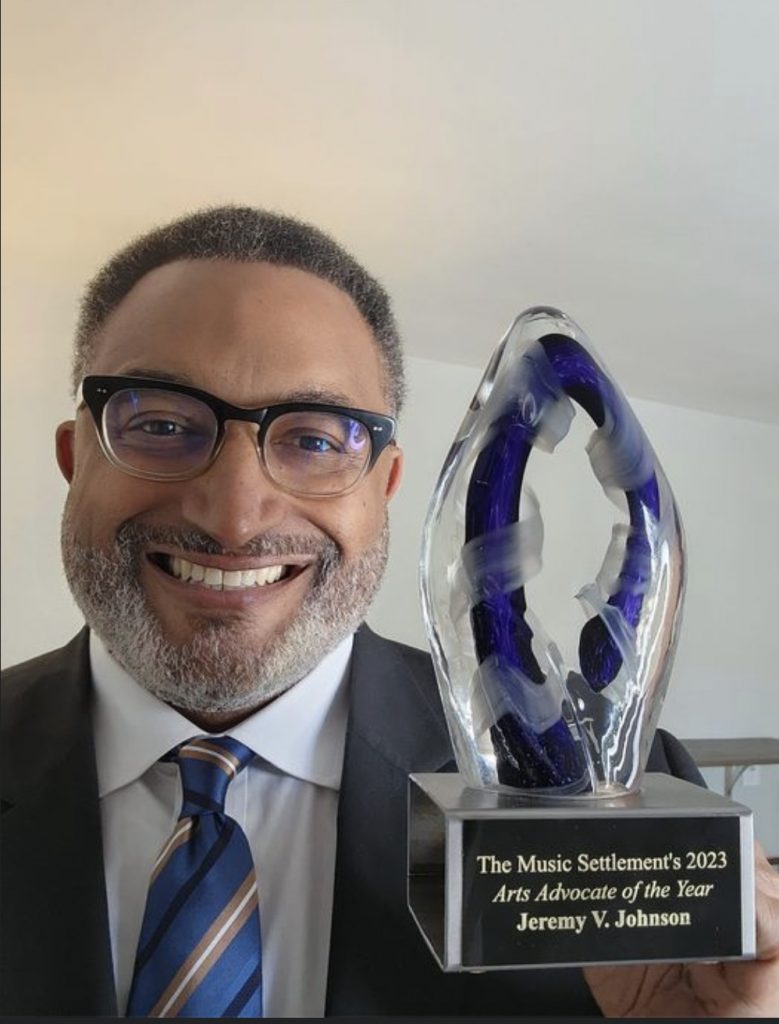by Jarrett Hoffman

•Today: Poiesis Quartet (pictured) with mezzo-soprano Nancy Maultsby in Rocky River
•Announcements: OLO’s 2024 repertory, and honors for Tri-C JazzFest Academy vocalist Ava Preston and Assembly for the Arts president and CEO Jeremy Johnson
•Interesting reads: new Milwaukee Symphony musicians’ contract with provisions to promote inclusivity and diversity in auditions, and a nonprofit aiming to bring free babysitting to arts institutions
•Almanac: Johann Strauss Sr., Colin Davis, and Glenn Gould, including a “conductorial tiff” or two
HAPPENING TODAY:
At 7:30 pm at West Shore Unitarian Universalist Church, the Rocky River Chamber Music Society presents the Poiesis Quartet with mezzo-soprano Nancy Maultsby in a program that includes a new work by Richard Stout inspired by the letters of Willa Cather. It’s free and will also be livestreamed. Read Mike Telin’s recent interview with Stout here.
ANNOUNCEMENTS:
Ohio Light Opera has announced the repertoire for its 2024 summer season, which includes The Arcadians, The Count of Luxembourg, The Gondoliers, Guys & Dolls, Me and My Girl, and The Sound of Music. Tickets go on sale January 10.
Vocalist Ava Preston, a member of the Tri-C JazzFest Academy, was among twenty high school jazz musicians in America selected by Monterey Jazz Festival to form this year’s Next Generation Jazz Orchestra, which performed at the Festival yesterday. Her remaining September schedule includes performances on Wednesday at Brother’s Lounge in Cleveland as part of the Swing Era Big Band, and on Saturday at Laurentia Winery in Madison with the Ava Preston Trio. Her original song Move Along can be heard on streaming platforms including here at Apple Music.

INTERESTING READS:
The Milwaukee Symphony Orchestra and its musicians have reached a two-year contract agreement that “also opens up intriguing possibilities for change in the MSO’s audition process,” with provisions to promote inclusivity and diversity, as Jim Higgins writes for the Milwaukee Journal Sentinel. Read here.
And an article by Jennifer Vanasco for NPR covers the Parent Artist Advocacy League for Performing Arts and Media and its goal to bring free babysitting to arts institutions around the country. According to PAAL founder Rachel Junqueira Spencer Hewitt (in the words of Vanasco), “It’s good for the organizations, who may see increased loyalty and gain new audiences; it’s good for the parent-artists who are supported; and it’s good for people who’d like to see an art exhibit or a play but can’t because child care is so expensive. Read here.
TODAY’S ALMANAC:
by Daniel Hathaway
On this date in 1849, Austrian composer Johann Strauss Sr. died in Vienna at the age of 45. Founder of the Strauss waltz dynasty, Johann Sr. is best known for his Radetzky March, his Op. 228 (!) which you can enjoy being played here by the Vienna Philharmonic on its New Year’s Concert 2011, conducted by Franz Welser-Möst.
On September 25, 1927, English conductor Colin Davis was born in Weybridge, Surrey. Sir Colin returned to conduct The Cleveland Orchestra in April, 2009, after a hiatus of 25 years. As reported in a Plain Dealer preview, his reappearance came at the urging of pianist Mitsuko Uchida. “She told me, ‘You’ve got to get back,’” recalled Davis, 82, by phone from his home in London, where Uchida also resides. “And I thought, ‘If she told me to do it, I’d better do it.’”
That concert in 2009 included the Second Symphony of Jean Sibelius, a composer whose music was a Davis specialty. In this video, he conducts the finale with the Gustav Mahler Jugendorchester at the 2008 BBC Proms.
And on this date in 1932, Canadian pianist Glenn Gould was born in Toronto. One of the great keyboard personalities of the 20th century, Gould was also among the most eccentric, demanding special conditions for his recitals and recordings and eventually giving up live performances entirely in favor of studio recordings over which he could exercise precise control.
For glimpses of Gould’s life and career, watch the documentary Genius Within — The Inner Life of Glenn Gould, and view François Gerard’s 32 Short Films about Glenn Gould.
Although Gould was most revered for his interpretations of Bach’s Goldberg Variations, many listeners also cherish his recording of Bach’s Partita No. 6. Watch a video here.
Gould soloed with George Szell and The Cleveland Orchestra, leading to a famous outburst on the part of the conductor. As related in the New York Times, the pianist “wasted more than an hour of orchestral rehearsal time turning the screws on the special chair he uses, explaining that he could not get it at just the right height. Szell finally exploded and told Gould in very explicit terms what he could do with the screws.”
Another conductorial tiff had Leonard Bernstein officially distancing himself from Gould’s tempo decisions in the First Brahms Concerto. Listen to Bernstein’s extraordinary pre-concert announcement to the audience here.



